(完整word版)人教版英语八年级下册英语第一单元学案
2020年人教版八年级下册英语Unit 1阅读写作专题训练(含解析与答题技巧)
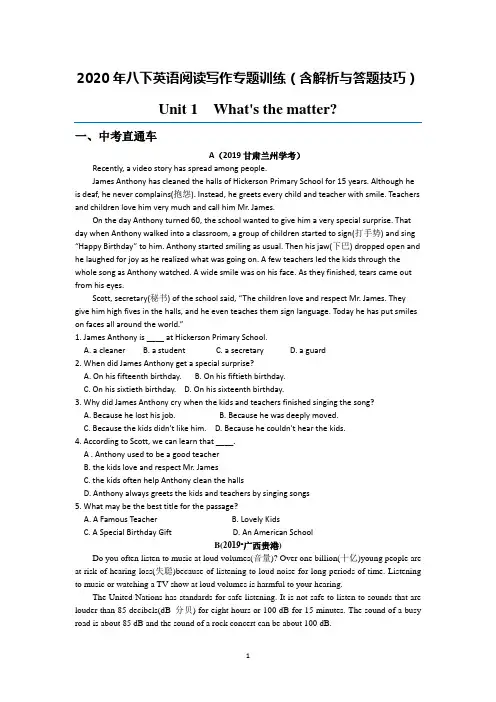
2020年八下英语阅读写作专题训练(含解析与答题技巧)Unit 1 What's the matter?一、中考直通车A(2019甘肃兰州学考)Recently, a video story has spread among people.James Anthony has cleaned the halls of Hickerson Primary School for 15 years. Although he is deaf, he never complains(抱怨). Instead, he greets every child and teacher with smile. Teachers and children love him very much and call him Mr. James.On the day Anthony turned 60, the school wanted to give him a very special surprise. That day when Anthony walked into a classroom, a group of children started to sign(打手势) and sing “Happy Birthday” to him. Anthony started smiling as usual. Then his jaw(下巴) dropped open and he laughed for joy as he realized what was going on. A few teachers led the kids through the whole song as Anthony watched. A wide smile was on his face. As they finished, tears came out from his eyes.Scott, secretary(秘书) of the school said, “The children love and respect Mr. James. They give him high fives in the halls, and he even teaches them sign language. Today he has put smiles on faces all around the world.”1. James Anthony is ____ at Hickerson Primary School.A. a cleanerB. a studentC. a secretaryD. a guard2. When did James Anthony get a special surprise?A. On his fifteenth birthday.B. On his fiftieth birthday.C. On his sixtieth birthday.D. On his sixteenth birthday.3. Why did James Anthony cry when the kids and teachers finished singing the song?A. Because he lost his job.B. Because he was deeply moved.C. Because the kids didn't like him.D. Because he couldn't hear the kids.4. According to Scott, we can learn that ____.A . Anthony used to be a good teacherB. the kids love and respect Mr. JamesC. the kids often help Anthony clean the hallsD. Anthony always greets the kids and teachers by singing songs5. What may be the best title for the passage?A. A Famous TeacherB. Lovely KidsC. A Special Birthday GiftD. An American SchoolB(2019•广西贵港)Do you often listen to music at loud volumes(音量)? Over one billion(十亿)young people are at risk of hearing loss(失聪)because of listening to loud noise for long periods of time. Listening to music or watching a TV show at loud volumes is harmful to your hearing.The United Nations has standards for safe listening. It is not safe to listen to sounds that are louder than 85 decibels(dB 分贝) for eight hours or 100 dB for 15 minutes. The sound of a busy road is about 85 dB and the sound of a rock concert can be about 100 dB.Loud noise is harmful to the inner ears(内耳). Most of us are born with about 16,000 hair cell(听毛细胞) in our inner ears. However, listening to loud noise for a long time can make these cells work too hard and cause some of them to die. This is what causes hearing loss.Some people might think that their music isn’t all that loud. But this can depend on where you are. For example, if you are in a noisy place like the subway, you might turn up your music too loud without realizing it. Later, when you listen to it at the same volume in a quiet place, you might feel uncomfortable.The World Health Organization said the “safe leve l” for most sounds is below 80 dB for up to 40 hours a week. A level of 80 dB is roughly equal to(大约相当于) the noise of a subway.66. Many young people are at risk of hearing loss because they__________.A .watch TV every day B. listen to music every dayC. listen to loud noise in the subwayD. listen to loud noise for a long time67. The sound level of a rock concert is about __________.A. 80 dbB. 85dBC. 100 dBD. 110dB68. What is loud noise harmful to?A. The inner ears.B. The brain.C. The heart.D. The eyes.69. What can you learn from the passage?A. We feel comfortable when listening to loud music in a quiet place.B. Most people are born with about 1,600 hair cells in the inner ears.C. It is not safe to listen to sounds that are louder than 85 dB for 15 minutes.D. Below 80 dB for up to 40 hours a week is the “safe level” for most sounds.70. What is the best title of the passage?A. Keep the Loud V olumes.B. Loud Noise Is Harmful to Hearing.C. The Risk of Listening to Music.D. Loud Noise Stops Ears from Working二、完形填空·链接课文体裁:说明文词数:198 难度:★☆☆建议用时:5分钟正确率:/10Everyone gets headaches sometimes. But how much do you know about 1? What may cause(引起) them? And what should we 2 if we have a headache? When should we go to see a doctor? Let’s talk something 3 them.The headache is not a disease(疾病), but it may show that something in our body is wrong. We may have 4 than one headache each month.Usually a 5 or some other illnesses may cause headaches. As we all know, when we have a cold, we often have a 6 and a sore 7 at first. When you feel worse and 8 your temperature, you probably find you have a fever, and then the headache comes. Besides, we may get a headache when we work too hard. We may get a headache when we exercise on an empty(空的) 9. We may get a headache when we don’t get enough sleep. When we have a headache, we should10 and rest. We should have a good sleep. We shouldn’t take too much e xercise if we are tired. If we often have headaches, we need to see a doctor.( )1. A. toothaches B. stomachaches C. headaches D. backaches( )2. A. did B. to do C. doing D. do( )3. A. about B. with C. at D. in( )4. A. less B. little C. more D. most( )5. A. blood B. fever C. break D. death( )6. A. headache B. toothache C. medicine D. cough( )7. A. head B. throat C. neck D. foot( )8. A. make B. shake C. show D. take( )9. A. stomach B. tooth C. neck D. head( )10. A. take a break B. see a dentist C. lie down D. go out to exercise三、阅读理解阅读理解A体裁:说明文词数:176+142 难度:★☆☆建议用时:5分钟正确率:/5Do you know growing pains(疼痛)? Growing pains aren’t a disease. Sometimes you don’t have to go to a doctor. Usually children can get them between the ages of 3 and 5 or 8 and 12. When children are over fifteen, most of them don’t get growing pains. Children often get growing pains in their legs. Growing pains often start before bedtime and sometimes in the middle of the night. But they go away by the morning. Doctors don’t know why. They think when children run, climb or jump a lot during the day, they may have pains in their legs at night.Parents can help children feel better by buying some medicine. But it is not good for children. Here are some ways that may help children feel better.1. Put a piece of warm cloth on the place where children feel painful.2. Ask children to stretch the legs like what they do in the P.E. class.3. Ask somebody to help massage(按摩) the painful legs.( )1. ____ probably gets growing pains.A. A girl at the age of 2B. A boy at the age of 6C. A girl at the age of 10D. A boy at the age of 18( )2. Children often have growing pains ____ according to the passage.A. on the backB. in the armsC. in the neckD. in the legs( )3. Which of the following is NOT mentioned(提及) in the passage?A. It is not good for children to take medicine if they have growing pains.B. How to massage children if they have growing pains.C. Advice on how to deal with(处理) growing pains.D. Children may get growing pains when they sleep at night.( )4. What does the underlined word “stretch” mean in Chinese?A. 伸展B. 绷紧C. 抚摸D. 击打( )5. What is the best title for this passage?A. Children’s ExerciseB. Children’s Growing PainsC. Children’s Health ProblemsD. Parents and Children阅读理解B体裁:应用文词数:212+130 难度:★★☆建议用时:6分钟正确率:/5( )1. How many people were injured or killed by the explosion that happened in Tongxu?A. 10B. 7C. 11D. 17( )2. What does the underlin ed word “illegal” mean in Chinese?A. 不正确的B. 不合法的C. 不安全的D. 不方便的( )3. Menyuan earthquake happened in .A. TibetB. QinghaiC. GansuD. Hebei( )4. People bought many things from the supermarket mainly because ____.A. it was difficult to buy these things in winterB. the traffic slowed downC. they were afraid to meet traffic accidentsD. they didn’t want to go out in snowy days( )5. Which of the following is TRUE according to the passage?A. People found out the reason for the explosion of the fireworks factory in Tongxu.B. Some people were badly injured in the earthquake.C. Snowy days caused many traffic accidents.D. A serious traffic accident influenced most of China from Jan. 22 to 24 in 2016.阅读理解C体裁:记叙文词数:211+156 难度:★★☆建议用时:7分钟正确率:/5I experienced a bus accident yesterday.I was going to visit my aunt in Agra. The bus left Shekohabad and reached near a bridge. The road rose very high at the bridge from both the sides. At the same time, a car was coming from the opposite direction. The bus driver tried to step on the brakes(刹车) but there was no time. So he gave a sudden turn. The road was not very broad(宽的) at the bridge. The result was that the driver couldn’t control the bus. It slipped(滑) from the road and fell into the river below. Every one of us gave a loud cry.There were fifty passengers in the bus—forty men, six women and four children. Four of the passengers died then. Seven were hurt. Luckily, I escaped without much hurt.The car stopped. Inside the car was an officer. He was very sorry for the poor passengers. He took the injured passengers in his car and sent them to the hospital quickly. Two of them died soon after.The police had little to do in the accident, because the driver had died. The most wonderful thing was the escape of the children.( )1. The writer went to Agra .A. to workB. to go fishingC. to visit his auntD. to meet an officer( )2. How many passengers were there in the bus?A. Twenty.B. Thirty.C. Forty.D. Fifty.( )3. What does the underlined word “escaped” mean in Chinese?A. 逃脱B. 保护C. 对抗D. 发展( ) 4. Which is the RIGHT order according to the passage?①The bus fell into the river below.②The bus driver tried to step on the brakes.③The car driver sent some passengers to the hospital.④A car was coming from the opposite direction.⑤The driver lost control of the bus.A. ③①④②⑤B. ④②⑤①③C. ②⑤③①④D. ④①③⑤②( )5. What can we learn from the passage?A. There were no children in the bus.B. The road at the bridge was very broad.C. The bus driver was badly hurt in the accident.D. Six passengers died in the accident.阅读理解D体裁:说明文词数:256 难度:★★★建议用时:8分钟正确率:/5阅读短文,从短文后的五个选项中选出能填入空白处的最佳选项,每个选项只能用一次。
(word完整版)人教版八年级下册英语单词表(带音标)
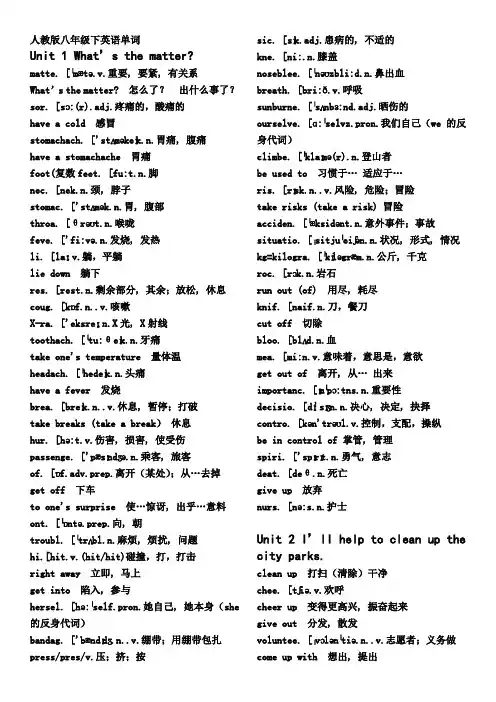
人教版八年级下英语单词Unit 1 What’s the matter?matte. [ˈmætə.v.重要, 要紧, 有关系What’s the matter? 怎么了?出什么事了?sor. [sɔ:(r).adj.疼痛的,酸痛的have a cold 感冒stomachach. ['stʌməkeɪk.n.胃痛, 腹痛have a stomachache 胃痛foot(复数feet. [fu:t.n.脚nec. [nek.n.颈, 脖子stomac. ['stʌmək.n.胃, 腹部throa. [θrəʊt.n.喉咙feve. ['fi:və.n.发烧, 发热li. [laɪ.v.躺,平躺lie down 躺下res. [rest.n.剩余部分, 其余;放松, 休息coug. [kɒf.n..v.咳嗽X-ra. ['eksreɪ.n.X光, X射线toothach. [ˈtu:θeɪk.n.牙痛take one's temperature 量体温headach. [ˈhedeɪk.n.头痛have a fever 发烧brea. [breɪk.n..v.休息, 暂停;打破take breaks (take a break)休息hur. [hə:t.v.伤害, 损害, 使受伤passenge. ['pæsɪndʒə.n.乘客, 旅客of. [ɒf.adv.prep.离开(某处);从…去掉get off 下车to one's surprise 使…惊讶, 出乎…意料ont. [ˈɒntə.prep.向, 朝troubl. [ˈtrʌbl.n.麻烦, 烦扰, 问题hi.[hit.v.(hit/hit)碰撞,打,打击right away 立即, 马上get into 陷入, 参与hersel. [hə:ˈself.pron.她自己, 她本身(she 的反身代词)bandag. ['bændɪdʒ.n..v.绷带;用绷带包扎press/pres/v.压;挤;按sic. [sɪk.adj.患病的, 不适的kne. [ni:.n.膝盖noseblee. [ˈnəʊzbli:d.n.鼻出血breath. [bri:ð.v.呼吸sunburne. [ˈsʌnbɜ:nd.adj.晒伤的ourselve. [ɑ:ˈselvz.pron.我们自己(we的反身代词)climbe. [ˈklaɪmə(r).n.登山者be used to 习惯于…适应于…ris. [rɪsk.n..v.风险, 危险;冒险take risks (take a risk) 冒险acciden. [ˈæksidənt.n.意外事件;事故situatio. [ˌsitjuˈeiʃən.n.状况, 形式, 情况kg=kilogra. [ˈkɪləgræm.n.公斤, 千克roc. [rɔk.n.岩石run out (of) 用尽, 耗尽knif. [naif.n.刀,餐刀cut off 切除bloo. [blʌd.n.血mea. [mi:n.v.意味着,意思是,意欲get out of 离开, 从…出来importanc. [ɪmˈpɔ:tns.n.重要性decisio. [dɪ'sɪʒn.n.决心, 决定, 抉择contro. [kən'trəʊl.v.控制,支配,操纵be in control of 掌管, 管理spiri. ['spɪrɪt.n.勇气, 意志deat. [deθ.n.死亡give up 放弃nurs. [nə:s.n.护士Unit 2 I’ll help to clean up the city parks.clean up 打扫(清除)干净chee. [tʃiə.v.欢呼cheer up 变得更高兴, 振奋起来give out 分发, 散发voluntee. [ˌvɔlənˈtiə.n..v.志愿者;义务做come up with 想出, 提出put off 推迟sig. [saɪn.n.标记, 符号, 标牌notic. [ˈnəʊtɪs.n..v.通知,公告;注意到hand out 分发call up 打电话给…某人, 征召used to 曾经…, 过去…lonel. ['ləʊnlɪ.adj.孤独的,寂寞的care for 照顾, 非常喜欢severa. [ˈsevrəl.prep.几个, 数个, 一些stron. [strɒŋ.adj.强壮的, 强烈的feelin. [ˈfi:lɪŋ.n.感觉, 感触satisfactio. [ˌsætɪs'fækʃn.n.满足, 满意jo. [dʒɔɪ.n.高兴, 愉快owne. [ˈəʊnə(r).n.所有者,物主try out 参加…选拔, 试用journe. ['dʒɜ:nɪ.n.(尤指长途)旅行, 行程rais. [reɪz.v.抬起,举起,筹集,征集midnight['midnait]n.午夜;子夜alon. [əˈləun.adv.独自, 单独repai. [riˈpɛə.v.修理, 修补fi. [fiks.v.修理,安装fix up 修理, 修补give away 赠送, 捐赠take after (外貌或行为)像broke. ['brəʊkən.adj.破损的, 残缺的whee. [wi:l.n..v.轮子, 车轮;旋转lette. [ˈletə.n.信件, 字母Mis. [mɪs.n.小姐set up 建立, 设立disable. [disˈeibld.adj.有残疾的,丧失能力的make a difference 影响, 有作用blin. [blaɪnd.adj.盲的, 盲目的, 失明的dea. [def.adj.聋的imagin. [ɪˈmædʒɪn.v.想象, 设想difficult. ['dɪfɪkəltɪ.n.困难ope. [ˈəʊpən.v.打开doo. [dɔ:.n.门carr. ['kærɪ.v.携带, 搬运trai. [treɪn.v.训练, 培养excite. [ɪkˈsaɪtɪd.adj.激动的, 兴奋的trainin. [ˈtreɪnɪŋ.n.训练, 培训kindnes. [ˈkaɪndnəs.n.仁慈, 善良, 亲切, 善意cleve. [ˈklevə.adj.聪明的, 机灵的understan. [ˌʌndəˈstænd.v.懂, 理解chang. [tʃeɪndʒ.n..v.改变interes. ['ɪntrəst.n..v.感兴趣;兴趣si. [sɜ:(r).n.先生mada. ['mædəm.n.夫人,女士Unit 3 Could you please clean your room?rubbis. [ˈrʌbɪʃ.n.垃圾, 废物take out the rubbish 倒垃圾fol. [fəʊld.v.对折, 折叠sweep/sw i:p/v.(swept/swept)扫;打扫mes. [mes.n.混乱, 杂乱, 不整洁thro. [θrəʊ.v.扔,投掷all the time 频繁, 反复neithe.[ˈnɑiðə.[ˈni:ðə.pron.adv.二者都不;也不shir. [ʃə:t.n.运动衫,衬衫as soon as 一…就…, 尽快pas. [pɑ:s.v.前行, 经过, 批准borro. ['bɒrəʊ.v.借, 借用len. [lend.v.借给, 借.finge. [ˈfiŋgə(r).n.手指hat. [heɪt.v.憎恶, 讨厌chor. [tʃɔ:(r).n.杂务, 乏味的工作whil. [wail.conj.当...时候, 而, 然而snac. [snæk.n.小吃, 点心, 快餐stres. [stres.n.精神压力, 心理负担wast. [weɪst.v.浪费,消耗in order to 目的是, 为了provid. [prə'vaid.v.提供, 供给, 供应anywa. [ˈeniwei.adv.无论如何,不管怎样, 而且depen. [diˈpend.v.取决于,依靠,依赖depend on 依靠于develo. [dɪˈveləp.v.发展, 壮大, 开发, 研制independenc. [ˌɪndɪ'pendəns.n.独立fairnes. [ˈfeənɪs.n.公正性, 合理性sinc. [sɪns.conj.因为, 既然neighbo. [ˈneɪbə.n.邻居take care of 照顾, 处理il. [ɪl.adj.生病的, 有病的dro. [drɔp.v.落下, 跌落independen. [ˌindiˈpendənt.adj.独立自主的, 不受约束的fai. [fɛə.adj.公平的, 公正的unfai. [ˌʌnˈfeə.adj.不公平的,有偏见的Unit 4 Why don’t you talk to your parents?allo. [əˈlaʊ.v.允许, 准许wron. [rɔŋ.adj.错误的What's wrong? 哪儿不舒服?look through 浏览, 快速查看gues. [ɡes.v.猜测, 估计dea. [di:l.v.处理,应付big deal 重要的事work out 成功地发展, 解决get on with 和睦相处, 关系良好relatio. [rɪˈleɪʃn.n.关系, 联系, 交往communicatio. [kəˌmju:nɪˈkeɪʃn.n.交流, 沟通argu. [ˈɑ:ɡju:.v.争论, 争吵clou. [klaʊd.n.云elde. ['eldə(r).adj.年级较长的instea. [ɪnˈsted.adv.代替whateve. [wɒtˈevər.pron.任何,不管什么,无论什么nervou. [ˈnə:vəs.adj.紧张不安的offe. ['a:fər.v.提供, 自愿给予prope. [ˈprɔpə.adj.合适的, 适当的secondl. [ˈsekəndli.adv.第二, 其次communicat. [kəˈmju:nikeit.v.沟通,通信,通讯explai. [ɪkˈspleɪn.v.讲解, 解释, 说明clea. [klɪə.adj.清晰的, 清楚易懂的cop. [ˈkɔpi.v.复制retur. [rɪ'tɜ:n.v.回来, 返回, 归还anymor. ['enɪmɔ:.adv.不再, 再也不membe. [ˈmembə.n.成员, 会员pressur. ['preʃə(r).n.压力compet. [kəm'pi:t.v.比赛, 竞争opinio. [əˈpɪnjən.n.意见, 想法, 看法skil. [skɪl.n.技能, 技巧typica. [ˈtɪpɪkl.adj.典型的footbal. [ˈfʊtbɔ:l.n.足球cut out 删去, 删除quic. [kwɪk.adj.快的, 迅速的continu. [kənˈtɪnju:.v.继续, 连续compar. [kəm'peə.v.比较compare…with 比较, 对比craz. [ˈkreɪzɪ.adj.疯狂的,狂热的push/puʃ/v.鞭策, 督促, 推动developmen. [diˈveləpmənt.n.发育, 成长, 发展caus. [kɔ:z.n..v.原因;造成, 使发生usua. [ˈju:ʒuəl.adj.通常的,平常的in one's opinion 依…看perhap. [pəˈhæps.adv.可能, 大概, 也许Unit 5 What were you doing when the rainstorm came?rainstor. [ˈreɪnstɔ:m.n.暴风雨alar. [əˈlɑ:m.n.闹钟go off (闹钟)发出响声begi. [bɪˈgɪn.v.(began)开始heavily[ˈhevɪli]adv.在很大程度上, 大量地suddenl. [ˈsʌdənli.adv.突然地pick up(=pick up the phone) 接电话strang. [streɪndʒ.adj.奇怪的, 陌生的, 奇特的stor. [stɔ:m.n.暴风雨win. [wɪnd.n.风ligh. [laɪt.n..v.电灯;点燃repor. [riˈpɔ:t.v.报导, 报告are. ['eərɪə.n.范围, 地域, 地区woo. [wʊd.n.树木, 木材, 树木windo. [ˈwindəu.n.窗户flashligh. ['flæʃlaɪt.n.手电筒, 火炬matc. [mætʃ.n.火柴,比赛beat [bi:t] v.(beat) 敲打, 打败agains. [əˈgenst.prep.反对, 对…不利aslee. [əˈsli:p.adj.睡着的,熟睡的fall asleep 进入梦乡, 睡着die down 逐渐变弱, 逐渐消失ris. [raɪz.v.(rose)上升, 升起falle. [ˈfɔ:lən.adj.倒下的, 落下的apar. [əˈpɑ:t.adv.分离,分开have a look 看一看ic. [ˈaɪsɪ.adj.覆盖着冰的, 冰冷的ki. [kɪd.n..v.(口语)小孩;开玩笑, 欺骗realiz. [ˈri:əlaɪz.v.认识到,了解make one's way 前往, 费力地前进passag. [ˈpæsɪdʒ.n.章节, 段落pupi. [ˈpju:pl.n.学生completel. [kəmˈpli:tli.adv.彻底地, 完全地shocke. [ʃɔkt.adj.震惊的, 震撼的silenc. [ˈsaɪləns.n.寂静,沉默in silence 沉默, 无声recentl. [ˈri:sntli.adv.不久前,近来,最近take down 拆除, 往下拽, 记录terroris. [ˈterərɪst.n.恐怖分子dat. [deɪt.n.日期, 日子towe. [ˈtaʊə(r).n.塔at first 首先, 最初trut. [tru:θ.n.真相,真理,事实Unit 6 An old man tried to move the mountains.shoot [ʃu:t] v.(shot) 投篮, 射击, 发射ston. [ˈstəʊn.n.石头wea. [wi:k.adj.虚弱的, 柔弱的go. [ɡɒd.n.上帝, 神remin. [rɪˈmaɪnd.v.提醒, 使想起bi. [bɪt.n.一点,小块a little bit 有点儿, 稍微silly [ˈsɪlɪ] adj.愚昧的;傻子, 蠢货instead of 代替, 反而turn into 变成objec. [ˈɒbdʒɪkt.n.物体, 目标, 物品hid. [haɪd.v.躲藏, 隐藏tai. [teil.n.尾巴magi. [ˈmædʒɪk.n.魔法, 巫术stic. [stɪk.n..v.棍, 棒;刺, 戳, 插excit. [ɪk'saɪt.v.使激动, 使兴奋Wester. ['westən.adj.西方的,欧美的once upon a time 从前stepsiste. [ˈstepsɪstə(r).n.继姐(妹)princ. [prɪns.n.王子fall in love 爱上, 喜欢上fi. [fɪt.v.适合, 合身coupl. ['kʌpl.n.(尤指)夫妻, 两人smil. [smaɪl.n..v.微笑marr. [ˈmæri.v.与某人结婚get married 结婚gol. [ɡəʊld.n.黄金, 金币empero. [ˈempərə(r).n.皇帝sil. [sɪlk.n.丝绸underwea. [ˈʌndəwɛə.n.内衣nobod. [ˈnəʊbədi.pron.无人,没有任何人,谁也不stupi. ['stju:pɪd.adj..n.愚蠢的,傻的;傻子chea. [tʃi:t.v.欺骗, 愚弄stepmothe. [ˈstepmʌðə(r).n.继母wif. [waɪf.n.妻子husban. [ˈhʌzbənd.n.丈夫whol. [həul.adj.全部的, 整体的scen. [si:n.n.舞台, (戏剧)场景moonligh. ['mu:nlaɪt.n.月光shin. [ʃaɪn.v.照耀, 发光brigh. [braɪt.adj..adv.明亮的,发亮的;明亮地groun. [graʊnd.n.地面lea. [li:d.n..v.领导, 主角;带路voic. [vɔis.n.嗓音brav. [breiv.adj.勇敢的Unit 7 What’s the highest mountain in the world?squar. [skweə(r).n.平方, 正方形mete. [ˈmi:tə.n.米dee. [di:p.adj.深的deser. [ˈdezət.n.沙漠populatio. [ˌpɔpjuˈleiʃən.n.人口(数量),全体居民Asi. [ˈeɪʒə.n.亚洲feel free (可以)随便(做某事)tou. [tuə.n.旅行, 观光wal. [wɔ:l.n.墙amazin. [əˈmeɪzɪŋ.adj.令人惊异的ancien. [ˈeɪnʃənt.adj.古代的, 古老的protec. [prəˈtekt.v.保护wid. [waɪd.adj.宽的,广阔的as far as I know 就我所知man-made adj.人造的achievemen. [əˈtʃi:vmənt.n.成就, 成绩southwester. [saʊθ'westən.adj.西南的,西南方向的thic. [θɪk.adj.厚的, 浓的includ. [ɪnˈklu:d.v.包括, 包含freezin. [ˈfri:zɪŋ.adj.极冷的, 冷冻的conditio. [kənˈdɪʃn.n.条件,状况take in 吸入, 吞入succeed[səkˈsi:d.v.成功, 实现目标, 完成challeng. [ˈtʃælɪndʒɪŋ.n..v.挑战,考验in the face of 面对(问题, 困难)achiev. [əˈtʃi:v.v.完成, 实现forc. [fɔ:s.n.力, 力量natur. ['neɪtʃə(r).n.自然界,大自然even though(=even if)即使, 虽然ocea. ['əʊʃn.n.海洋the Pacific Ocean 太平洋cm(centimeter. [ˈsentɪˌmi:tə.n.厘米weig. [wei.v.称…重量birt. [bɜ:θ.n.出生,诞生at birth 出生时up to 到达(某数量, 程度), 不多于adul. .əˈdʌlt.n.成年人bambo. [bæmˈbu:.n.竹子endangere. [ɪnˈdeɪndʒəd.adj.有危险的, 濒临灭绝的, 濒危的researc. [rɪˈsɜ:tʃ.n..v.研究, 调查keepe. [ˈki:pə(r).n.饲养员, 保管人awak. [əˈweɪk.adj.醒着excitemen. [ɪkˈsaɪtmənt.n.激动,兴奋walk into 走路时撞到fall over 绊倒or so 大约illnes. [ˈɪlnəs.n.疾病, 生病wil. [waɪld.adj.野性的, 野生的governmen. [ˈgʌvənmənt.n.政府whal. [weɪl.n.鲸protectio. [prəˈtekʃn.n.保护, 保卫hug. [hju:dʒ.adj.巨大的,极多的Unit 8 Have you read Treasure Island yet?treasur. [ˈtreʒə.n.财宝, 财富islan. [ˈaɪlənd.n.岛屿full of 满是…的, (有)丰富的classi. [ˈklæsɪk.n.经典著作, 名著pag. [peɪdʒ.n.(书或纸张的)页, 面, 张hurr. ['hʌrɪ.v.匆忙,赶快hurry up 赶快, 急忙(做某事)du. [dju:.adj.预期的, 到期的shi. [ʃɪp.n.船too. [tu:l.n.工具gu. [ɡʌn.n.炮, 枪mar. [mɑ:k.n..v.分数, 记号;作标记san. [sænd.n.沙滩, 沙canniba. [ˈkænɪbl.n..adj.食人肉者;同类相残的, 凶残的toward. [təˈwɔ:dz.prep.向着, 朝着, 对于,关于lan. [lænd.n..v.陆地, 大地, 国土;着陆fictio. [ˈfɪkʃn.n.小说,虚构,编造science fiction 科幻小说technolog. [tekˈnɒlədʒɪ.n.科技, 工艺Frenc. [frentʃ.n..adj.法语, 法国人(的)po. [pɒp.n.流行音乐roc. [rɑk.n.岩石, 摇滚乐ban. [bænd.n.乐队country music 乡村音乐foreve. [fərˈevə(r).adv.永远abroa. [əˈbrɔ:d.adv.在国外, 到国外actuall. [ˈæktʃʊəli.adv.真实地,实际上,说实在的ever since 自从fa. [fʌn.n.乐趣souther. [ˈsʌðən.adj.南方的moder. [ˈmɔdən.adj.现代的, 现代化的succes. [sək'ses.n.成功belon. [biˈlɔŋ.v.属于one another 互相laughte. [ˈlɑ:ftə(r).n.笑, 笑声beaut. [ˈbju:ti.n.美丽, 美好的事物millio. [ˈmiljən.num.百万recor. ['rekɔ:d.n..v.记录, 唱片;录制, 录音introduc. [ˌɪntrəˈdju:s.v.介绍, 传入, 引进lin. [lain.n.排,队,列Unit 9 Have you ever been to a museum?amusemen. [ˌəˈmju:zmənt.n.娱乐, 消遣, 游戏amusement park 游乐场somewher. [ˈsʌmweə.adv.某处, 在某处camer. [ˈkæmərə.n.照相机inventio. [ɪnˈvenʃn.n.发明, 创造inven. [inˈvent.v.发明, 创造unbelievabl. [ˌʌnbɪˈli:vəbl.adj.难以置信的,不真实的progres. [ˈprəʊɡres.n.进步, 进展rapi. [ˈræpɪd.adj.迅速的, 快速的unusua. [ˌʌnˈju:ʒuəl.adj.特别的, 不寻常的toile. [ˈtɔɪlət.n.坐便器, 厕所encourag. [inˈkʌridʒ.v.鼓励, 激励socia. [ˈsəuʃəl.adj.社会的peacefu. [ˈpi:sful.adj.和平的,平静的tea art 茶艺performanc. [pəˈfɔ:məns.n.表演, 演出perfec. [ˈpɜ:fɪkt.adj.完美的,理想的,完全的tea set 茶具itsel. [ɪtˈself.pron.它自己, 它本身collec. [kəˈlekt.v.收集a couple of 一对, 两个, 几个Germa. [ˈdʒɜ:mən.n..adj.德语, 德国人(的)them. [θi:m.n.题目, 主题, 作文rid. [raɪd.n..v.骑, 乘;(短途)旅程provinc. ['prɒvɪns.n.省, 省份thousan. [ˈθaʊznd.num.一千thousands of 数以千计的, 许许多多的on the one hand …on the other hand 一方面…另一方面saf.[seɪf.adj.安全的, 保险的simpl. [ˈsimpli.adv.仅仅, 只, 不过fea. [fiə.n..v.恐惧,害怕whether [ˈweðə(r)] conj.不管…还是,或者…或者, 是否India. [ˈɪndjən.adj.印度的, 印度人的Japanes. [ˌdʒæpəˈni:z.n.adj.日本人,日语;日本的fo. [fɒks.n.狐狸all year around 全年equato. [iˈkweitə.n.赤道wheneve. [wenˈevə.conj.无论何时sprin. [spriŋ.n.春天mostl. [ˈməustli.adv.大多数地, 主要地, 通常locatio. [ləʊˈkeɪʃn.n.地点,位置Unit 10 I’ve had this bike for three years.yar. [jɑ:d.n.院子yard sale 庭院拍卖会swee. [swi:t.adj..n.甜的, 糖果memor. [ˈmemərɪ.n.记忆, 记忆力, 回忆cen. [sent.n.分, 分币to. [tɔɪ.n.玩具bea. [bɛə.n.熊make. [ˈmeɪkə(r).n.生产者,制造者bread maker 面包机scar. [skɑ:f.n.围巾, 披巾, 头巾sof. [sɔft.adj.柔软的soft toy 软体玩具, 布绒玩具chec..[tʃek.n..v.餐馆账单;检查check out 察看, 观察boar. [bɔ:d.n.板子,甲板board game 棋类游戏junio. [ˈdʒu:nɪə(r).adj.地位低下的junior high school 初中clea. [klɪə.adj.清晰的, 清澈的clear out 清理, 清除掉bedroo. [ˈbedru:m.n.卧室no longer 不再, 不复ow. [əun.adj.属于自己的railwa. [ˈreɪlweɪ.n.铁路, 铁道par. [pɑ:t.n.部分,零部件part with 放弃, 交出certai. [ˈsə:tn.adj.某一,确定的,无疑.as for 至于, 关于hones. [ˈɒnɪst.adj.诚实的,正直的to be honest 说实在的whil. [wail.conj.当...时候, 一段时间, 一会儿truthfu. [ˈtru:θfl.adj.诚实的, 真实的hometow. [ˈhəʊmtaʊn.n.家乡, 故乡nowaday. [ˈnaʊədeɪz.adv.现今, 现在, 目前searc. [sɜ:tʃ.v.搜索, 搜查amon. [əˈmʌŋ.prep.在其中…之一crayo. ['kreɪən.n.彩色铅笔sham. [ʃeɪm.n.羞耻regar. [rɪ'ɡɑ:d.n..v.致敬, 问候;将…视为coun. [kaunt.n..v.计算, 计数;有价值centur. ['sentʃərɪ.n.世纪, 百年accordin. [ə'kɔ:dɪŋ.adv.依照, 按照opposit. [ˈɔpəzit.prep.&adj.在…对面, 与…相对;对面的especiall. [ɪˈspeʃəli.adv.特别, 尤其childhoo. [ˈtʃaɪldhʊd.n.孩童时期conside. [kənˈsidə.v.仔细考虑,思考,注视,close to 几乎, 接近hol. [həuld.v.拥有,抓住。
(全册合集)河南焦作市八年级英语下册教案人教版word文档可编辑共163页
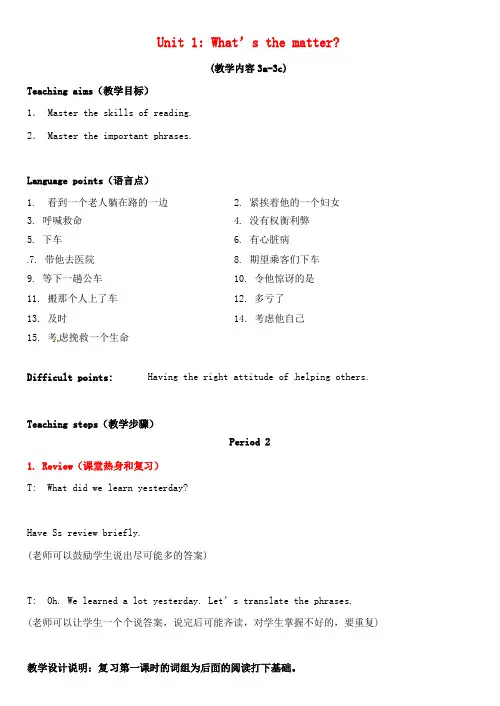
Unit 1: What’s the matter?(教学内容3a-3c)Teaching aims(教学目标)1.Master the skills of reading.2.Master the important phrases.Language points(语言点)1. 看到一个老人躺在路的一边2. 紧挨着他的一个妇女3. 呼喊救命4. 没有权衡利弊5. 下车6. 有心脏病7. 带他去医院8. 期望乘客们下车9. 等下一趟公车10. 令他惊讶的是11. 搬那个人上了车12. 多亏了13. 及时14. 考虑他自己15. 考虑挽救一个生命Difficult points: Having the right attitude of helping others.Teaching steps(教学步骤)Period 21. Review(课堂热身和复习)T: What did we learn yesterday?Have Ss review briefly.(老师可以鼓励学生说出尽可能多的答案)T: Oh. We learned a lot yesterday. Let’s translate the phrases. (老师可以让学生一个个说答案,说完后可能齐读,对学生掌握不好的,要重复)教学设计说明:复习第一课时的词组为后面的阅读打下基础。
2. Pre-readingT: present a picture) Ss, look at the picture. Can you guess:1. What happened to the old man?2. Whether the driver will save the old man?(老师可以鼓励学生多说,提高学生的口语)教学设计说明:通过展示图片来引起学生的兴趣,通过让学生猜测来提高学生口语,3. While-readingI.T: Now, let’s check your guesses. Turn to Page 3, skim the passage and answer the questions.1.What did the driver see when bus No. 26 was going along Zhonghua Road?2.Thanks to whom, the doctor saved the man in time?在检测答案时,老师引导学生注意文章的头和尾。
八年级英语下册 Unit1精品教学案(共10课时) 牛津译林版
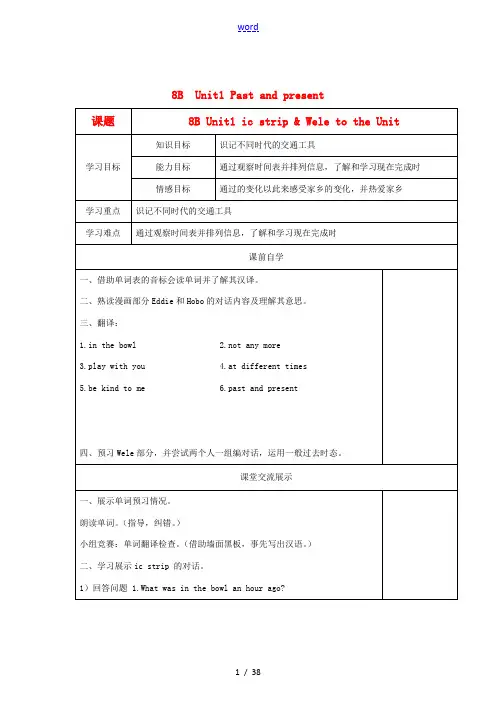
8B Unit1 Past and present8B Units1导学案参考答案Unit1第一课时:一、1.was 2.has eaten 3.to have 4.to play 5.is eating 6.took 7.rode8.will be二、1.would like , grows up 2.walks to school 3.goes to work by bus 4.flies to5.don’t want to any more第二课时:一、1.know about 2.get married 3.move out 4.water pollution 5.in the centreof6.feel lonely7.turn into8.from time to timeed to do 10.in some ways二、well has lived southern got married in the centre of children has changed a lotmarket stallsHas turned into to play cards pleasant shoe factory waste waterfish and plants polluted took action cleaner in some ways open space lonely第三课时:一、1. I don’t want to play with you any more.2.There used to be the home of birds.3.He live in Beijing since he moved here.4.In the past ,many people had no money to go to school.5.Nanjing has changed a lot in the past five years.6.Many friends have moved to other places ,so I feel lonely from time to time.7.I had an interview with my Chinese teacher this morning.8.It has bee more difficult to play chess with my old friends.二、1.Where have they gone ..2.How long has lived3.When was born4.you helping me第四课时:一、1.dishonest 2.unhappy 3.unlucky 4.impolite 5.unkind二、D C C B C A三、1.cheaper 2.healthiest 3.impossible 4.safely 5.well better第五课时:一、1.They haven’t read the book yet.Have they read the book yet? Yes, they have/ No , they haven’t1.How long has Daniel stayed in Shanghai?2. I have known him for ten years.3.Sandy has been in Beijing for half an hour.二、1. Have seen have did see2.lent hasn’t given 3.have been did visit第六课时:一、C C A A D B二、1. He has already finished homework.2.Have you ever been to Beijing?3.I have known Linda for 3years.4. I have just seen Lily.5.We haven’t heard from him for a long time.第七课时:一、1.is 2.do 3.will be 4.shall go 5.taught 6.has taught 7.has gone8.Have seen 9.have learned 10.will arrive二、1.How long have you known him?2.Has Jane finished her homework?3.I haven’t worked in this school for two years.4.Why hasn’t Jim finishedhis homework?5.when did you buy this watch?6.Who is the old man next to Lily?7.Which girl is my sister?8.How far is your home from your school?第八课时:一、1.advantages 2.reduce 3.changed 4.developments 5.service6.interview7.realizes 9.repair二、1.recently 2.unpleasant 3.impolite 4.have done 5.left6.southern7.polluted8.Has arrived arrived9.has eaten 10.have been第九课时:第十课时:一、1.as often as before 2. have an interview with sb ed to do sth 4.so big and modern5.in the north of二、1. was has lived 2.was made 3.Has arrived arrived 4.has eaten5.safely6.has been7.have been三、1.B 2.C 3.B 4.C 5.D 6.A四、1.Have you anything 2.doesn’t provide any longer 3.since ago ed to5.has been to。
2022年人教版八年级英语全册Unit1同步练习及答案(Word版)
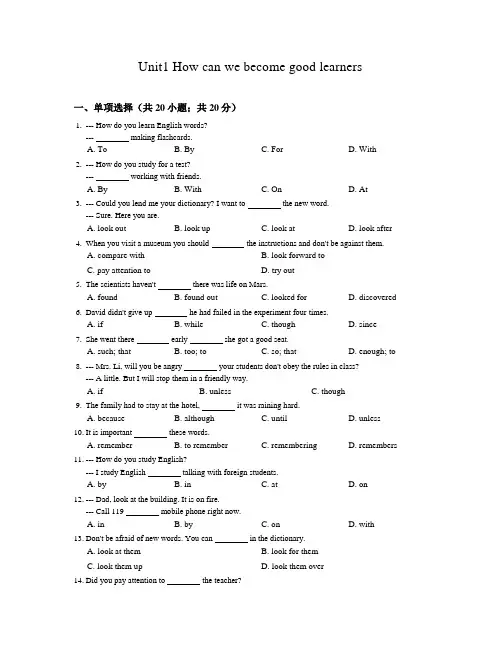
Unit1 How can we become good learners一、单项选择(共20小题;共20分)1. --- How do you learn English words?--- making flashcards.A. ToB. ByC. ForD. With2. --- How do you study for a test?--- working with friends.A. ByB. WithC. OnD. At3. --- Could you lend me your dictionary? I want to the new word.--- Sure. Here you are.A. look outB. look upC. look atD. look after4. When you visit a museum you should the instructions and don't be against them.A. compare withB. look forward toC. pay attention toD. try out5. The scientists haven't there was life on Mars.A. foundB. found outC. looked forD. discovered6. David didn't give up he had failed in the experiment four times.A. ifB. whileC. thoughD. since7. She went there early she got a good seat.A. such; thatB. too; toC. so; thatD. enough; to8. --- Mrs. Li, will you be angry your students don't obey the rules in class?--- A little. But I will stop them in a friendly way.A. ifB. unlessC. though9. The family had to stay at the hotel, it was raining hard.A. becauseB. althoughC. untilD. unless10. It is important these words.A. rememberB. to rememberC. rememberingD. remembers11. --- How do you study English?--- I study English talking with foreign students.A. byB. inC. atD. on12. --- Dad, look at the building. It is on fire.--- Call 119 mobile phone right now.A. inB. byC. onD. with13. Don't be afraid of new words. You can in the dictionary.A. look at themB. look for themC. look them upD. look them over14. Did you pay attention to the teacher?A. listen toB. listening toC. listenD. look15. --- Did you know who tea?--- The emperor Shennong did.A. foundB. discoveredC. found outD. invent16. Switzerland is very small, it is the land of watch and it is very rich.A. Though; butB. Because; soC. Because; /D. Though; /17. The camera is expensive I can't afford it.A. so; thatB. such; thatC. so; asD. too; to18. --- Good news! There will be a concert tonight.--- Really? Yang Kun comes to sing one song, I'll be very excited.A. UnlessB. IfC. BeforeD. Until19. Tony never spends money in buying books he doesn't like reading.A. butB. becauseC. thoughD. until20. is easy for the boy in the river.A. That; to swimB. It; to swimC. It; standingD. That; standing二、单词拼写(单句首字母填空)(共10小题;共10分)21. Our country has done something to stop population i .22. Let me tell you a saying: K is power(力量).23. The students r the story many times until they can tell the story naturally.24. Did you know who f (发现) America?25. If you want to learn English well, please read a every morning. It really helps a lot.26. Our English teacher's p is good, so we can understand her well.27. The e on her face shows she is happy.28. Every host country c its own slogan.29. He often takes an a part in the sports meeting and he can get very good results each time.30. The car runs at a s of 110 kilometres an hour.三、单词拼写(根据中文提示拼写单词)(共10小题;共10分)31. The population continues to (增加;增长).32. I think (知识) is more important than money.33. My parrot is clever enough to learn to (重复) the words I say.34. Chinese people were the first to (发现) the South China Sea.35. Goodness me! Your (发音) is very good.36. (物理) is my favourite subject.37. Reading (出声) is a good way of learning English.38. The nurse looked after so many (病人) but she felt very happy.39. That's my grandmother. She is 84. You wouldn't believe how (活跃的) she is!40. The boy lost his (能力) to walk when he was five years old.四、翻译(根据中文提示完成句子)(共5小题;共10分)41. 课堂上你应该注意听讲。
人教版八年级英语下册单元习题unit 1 section b(word版,无答案)-教育文档
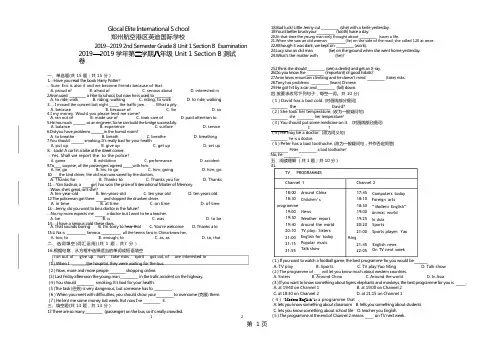
Glocal Elite International S chool 郑州航空港区英迪国际学校2019--2019 2nd Semester Grade 8 Unit 1 Section B Examination20192019 学年第学期年级 Unit 1 Section B 测试卷18.Bad luck! Little Jenny cut (she) with a knife yesterday. 19.You'd better brush your (tooth) twice a day.20.At that time the young man only thought about (save) a life.21.When she saw an old woman (lie) on the side of the road, she called 120 at once.22.Although it was dark, we kept on (work).23.Lucy saw an old man (lie) on the ground when she went home yesterday. 24.What's the matter with (he)?25.I think she should (see) a dentist and get an X-ray. 26.Do you know the (important) of good habits? 27.Aron loves mountain climbing and he doesn't mind (take) risks. 28.Tony has problems (learn) Chinese. 29.He got hit by a car and (fall) down. 四.按要求改写下列句子,每空一词。
八年级英语下册教案人教版核心素养unit 1英文版
八年级英语下册教案人教版核心素养unit 1英文版English: In Unit 1 of the eighth grade English textbook, students will be focusing on developing their core literacy skills through the theme of "Wonderful Plants". The unit covers various aspects of plants, such as their structures, functions, and importance to human life and the environment. Students will engage in activities that encourage critical thinking, communication, collaboration, and creativity. They will also have opportunities to improve their reading, writing, listening, and speaking skills through a variety of tasks and exercises. By the end of the unit, students will have a deeper understanding of the role that plants play in the world and the importance of preserving and protecting them for future generations.中文翻译: 在八年级英语教科书的第一单元中,学生将专注于通过“奇妙的植物”主题发展其核心素养技能。
(完整word版)人教新目标八年级下册英语课文文本可打印说课材料
ng
Or imagine you can’t walk ou use your hands easily.
help move do make visit spend
a good name for him because I feel very lucky to have him. You see, I’m
was, were, when or while.
Monkey. Most
.
Sometimes he
Journey to the West. Once
sel: Be quiet! I’m going outside to get something in the moonlight. Now, go to sleep.
:Last year I went to the Hangzhou National Tea Museum. It’s a
just as enjoyable as drinking the tea itself. I’ve finally realized why
ever tried Chinese food outside of China? Maybe you fear that you won’t be
way! I’ve also learned that
:I’ve recently been to a very unusual museum in India, the
seum of Toilets. I just couldn’t believe my eyes when I saw
don’t think
ildren. “Kids should have time to relax and think for
(完整版)英语人教版八年级下册What-is-the-matter教案
Unit 1 What’s the matter?教案Background information:Students ( Ss for short): 50 Junior high school students, Grade 8Lesson duration: 45 minutesTeaching objectives:By the end of the lesson, students should be able to :1、Master the vocabulary related to “diseases”.2、Master the expressions of giving advice3、Talk about health problems by using“What’s the matter? I have a……”and give advice by using “You should ……You sho uldn’t……Teaching contents:New vocabulary: “matter , cold , fever , advice ,toothache ……”New structures: 1. What’s the matter?I have a ……2. You should ……Key points: 1.Master of the structure. “What’s the matter?”2.Master the structure of giving advice. “Youshould……”Teaching methods: 1.Task-based Language Teaching2. Communicative Language Teaching. Teaching aids: 1. PPT2.Picture3.BlackboardTeaching proceduresStep I . Warming up: Greetings (3mins)1. Greeting the whole class as usual.T:Good morning, class. What date is today?/what day is it today?S:……Step II. Lead-in: A English song(2mins)1. Listen to an English song: (using the PPT to play a song)T:First , let us listen to an English song and do some reviewabout the words that last lesson we have learned.Lyrics of the song:(Head and shoulder knees and toes).Head and shoulders, knees and toes, knees and toes.Head and shoulders, knees and toes, knees and toes.eyes and ears and mouth and nose.Head and shoulders, knees and toes, knees and toes.Step III Review (5mins)1. Introduce the word “head” and “headache”T:How many parts of the body can you speak? What is this?(pointto the head)S: ……T: Yes, very good. This is my head . we can use our head to( think )<T stop for a while and guide Ss to answer>Oh ,Butsometimes I have a headache.< T write the word “headache” onthe blackboard>2. Ss read the new words after T “head” and “headache”.3. Display the rest of words in the same way.< back---backache >< tooth---toothache >< stomach---stomachache >Step IV Presentation: The new words1.Ss read each of the new words after T three times.List of words: matter , cold , fever , advice ,toothache ……2.Check if Ss can read the new words by themselves correctly.3.Play the game : “High and low voice” to consolidate the new words.T:All the students close your book, let us play a game .If I say theword in high voice ,you should say the word in low voice. If I say the word in low voice, you should say the word in high voice. Let us see which students do it correctly and quickly.4.Read the new words together.Step VI New structure(12mins)1.Show a picture on the PPT and T point at the picture .T: Look at the picture ,there are some students in thedispensary .[dɪˈspɛnsəri] 医务室What’s the matter withthem?(反复强调what is the matter?) Who can tell meWhat’s the matter with them? Any volunteers? Ok ,you please!Chinese or English are both ok.S: ……T:Ok ,very good . Look at the first girl with red hair. What’s thematter with her?(In turn to asked each student's situation, so thatstudents can quickly master the structure “What’s the matter?”) S:……2. Give Ss a model of a dialogue .D: What’s the matter?S:I have a fever/cold/stomachache/toothache/headache.D:You should drink lots of water.S:Thank you.……3.Ask them to make a conversation according to picture.4.Explain the new structure .a). What’s the matter?是一个疑问句,用于询问对方的身体情况,也是医生询问病人的常用语。
(完整word版)八年级英语下册第一单元重点单词汇总表(人教版),推荐文档
八年级英语下册第一单元重点单词汇总表(人教版)鍏勾绾ц嫳璇笅鍐岀涓€鍗曞厓閲嶇偣鍗曡瘝姹囨€昏〃锛堜汉鏁欑増锛?銆愰噸鐐瑰崟璇嶃€?matter [藞m忙t蓹] v. 閲嶈锛岃绱э紝鏈夊叧绯?What鈥檚the matter? 鎬庝箞浜嗭紵鍑轰粈涔堜簨浜嗭紵sore [s蓴:(r)] adj. 鐤肩棝鐨勶紝閰哥棝鐨?have a cold 鎰熷啋stomach ['st蕦m蓹k] n. 鑳冿紝鑵归儴stomachache ['st蕦m蓹ke瑟k] n. 鑳冪棝锛岃吂鐥?have a stomachache 鑳冪棝foot(澶嶆暟feet) [fu:t] n. 鑴?neck [nek] n. 棰堬紝鑴栧瓙throat [胃r蓹蕣t] n. 鍠夊挋fever ['fi:v蓹] n. 鍙戠儳锛屽彂鐑?lie [la瑟] v. 韬猴紝骞宠汉lie down 韬轰笅rest [rest] n. 鍓╀綑閮ㄥ垎锛屽叾浣欙紱鏀炬澗锛屼紤鎭?cough [k蓲f] n. & v. 鍜冲椊X-ray ['eksre瑟] n. X鍏夛紝X灏勭嚎toothache [藞tu:胃e瑟k] n. 鐗欑棝take one's temperature 閲忎綋娓?headache [藞hede瑟k] n. 澶寸棝have a fever 鍙戠儳break [bre瑟k] n. & v. 浼戞伅锛屾殏鍋滐紱鎵撶牬take breaks (take a break锛?浼戞伅hurt [h蓹:t] v. 浼ゅ锛屾崯瀹筹紝浣垮彈浼?passenger ['p忙s瑟nd蕭蓹] n. 涔樺锛屾梾瀹?off [蓲f] adv. prep. 绂诲紑锛堟煇澶勶級锛涗粠鈥﹀幓鎺?get off 涓嬭溅to one's surprise 浣库€︽儕璁讹紝鍑轰箮鈥︽剰鏂?onto [藞蓲nt蓹] prep. 鍚戯紝鏈?trouble [藞tr蕦bl] n. 楹荤儲锛岀儲鎵帮紝闂hit [hit] n. & v. 纰版挒锛屾墦锛屾墦鍑?right away 绔嬪嵆锛岄┈涓?get into 闄峰叆锛屽弬涓?herself [h蓹:藞self] pron. 濂硅嚜宸憋紝濂规湰韬紙she鐨勫弽韬唬璇嶏級bandage ['b忙nd瑟d蕭] n. & v. 缁峰甫锛涚敤缁峰甫鍖呮墡sick [s瑟k] adj. 鎮g梾鐨勶紝涓嶉€傜殑knee [ni:] n. 鑶濈洊nosebleed [藞n蓹蕣zbli:d] n. 榧诲嚭琛€breathe [bri:冒] v. 鍛煎惛sunburned [藞s蕦nb蓽:nd] adj. 鏅掍激鐨?ourselves [锟斤拷:藞selvz] pron. 鎴戜滑鑷繁锛坵e鐨勫弽韬唬璇嶏級climber [藞kla瑟m蓹(r)] n. 鐧诲北鑰?be used to 涔犳儻浜庘€?閫傚簲浜庘€?risk [r瑟sk] n. & v. 椋庨櫓锛屽嵄闄╋紱鍐掗櫓take risks (take a risk) 鍐掗櫓accident [藞忙ksid蓹nt] n. 鎰忓浜嬩欢锛涗簨鏁?situation [藢sitju藞ei蕛蓹n] n. 鐘跺喌锛屽舰寮忥紝鎯呭喌kg=kilogram [藞k瑟l蓹gr忙m] n. 鍏枻锛屽崈鍏?rock [r蓴k] n. 宀╃煶run out (of) 鐢ㄥ敖锛岃€楀敖knife [naif] n. 鍒€锛岄鍒€cut off 鍒囬櫎blood [bl蕦d] n. 琛€mean [mi:n] v. 鎰忓懗鐫€锛屾剰鎬濇槸锛屾剰娆? get out of 绂诲紑锛屼粠鈥?鍑烘潵importance [瑟m藞p蓴:tns] n. 閲嶈鎬?decision [d瑟's瑟蕭n] n. 鍐冲績锛屽喅瀹氾紝鎶夋嫨control [k蓹n'tr蓹蕣l] v. 鎺у埗锛屾敮閰嶏紝鎿嶇旱be in control of 鎺岀锛岀鐞?spirit ['sp瑟r瑟t] n. 鍕囨皵锛屾剰蹇?death [de胃] n. 姝讳骸give up 鏀惧純nurse [n蓹:s] n. 鎶ゅ+Judy鏈辫开锛堝コ鍚嶏級ancy鍗楀笇锛堝コ鍚嶏級Mandy鏇艰开锛堝コ鍚嶏級Aron Ralston闃夸鸡銉荤綏灏旀柉椤?Utah鐘逛粬宸烇紙缇庡浗锛?。
- 1、下载文档前请自行甄别文档内容的完整性,平台不提供额外的编辑、内容补充、找答案等附加服务。
- 2、"仅部分预览"的文档,不可在线预览部分如存在完整性等问题,可反馈申请退款(可完整预览的文档不适用该条件!)。
- 3、如文档侵犯您的权益,请联系客服反馈,我们会尽快为您处理(人工客服工作时间:9:00-18:30)。
八年级下册Unit 1 What’s the matter?Section A1. What’ s the matter? 怎么啦?出什么事情了?【解析】What’ s the matter with you?= What’s the trouble with you?= What’ s wrong with you?你怎么了?= What’s up?= What happens to sb.?【2013自贡3】18. —What’s the matter ______ Tom. He is wet through.—His car ran _______ the river.A.with; inB.to; intoC.with; into—What’s the matter with you ?— I have a bad cold.( ) ①What’s ____ with you?A. troubleB. the matterC. the wrongD. matter( )②— ______?— Nothing serious , but a bit tired.—Better have a rest now, dear.A. Is that allB. Is there anything elseC. What’s thisD. What’s the matter with yo u【2011.云南昆明】27. —What’s the matter with Tina?—_______________.A. She is away.B. She is cool.C. She has a sore throat.D. She should take some medicine【拓展】matter的用法(1) It doesn’t matter没关系(用来回答别人道歉时的用语)( ) —I’m sorry to break your pen.—_______A. That’s rightB. It doesn’t matterC. Thank you【2013黑龙江齐齐哈尔】17.-I have a pain in my back.- _____ . You’d better see a doctor.A. I’m sorry to hear thatB. Nothing seriousC. It doesn’t matter【2013四川广安】26.—Sorry, I'm late again.—______.A.That’s OK B.It doesn't matter C.Good idea2. I have a cold 我感冒了I have a stomachache 我患胃痛I have a sore back. 我背痛。
【解析1】 have a/an + 疾病名词“患……病” (cold/fever/cough)have a sore throat 患喉咙痛 have a sore back 患背痛have a fever 发烧 have a cold =catch a cold 患感冒have a stomachache 患胃痛 have a toothache患牙痛have a headache 患头痛 have a backache患背痛①Mike’s sister _________________(not have) a stomachache.【2012曲靖中考】I didn’t sleep well last night, because I _____ a toothache .A. wasB. wentC. hadD. took【2013山东莱芜】—Tony, What’s ___ matter with you?— I have _____ toothache.A. a; theB. the; aC. /; theD. the; /【解析2】back n 背;背部 at the back of......在......的后面go/come back 返回 give back 归还3. hand n 手 hand in hand 手拉手V 交给;传递 hand in 上交 hand on 依次传递 hand out 分发4. She talked too much yesterday and didn’t drink enough water.她昨天说话太多了并且没有喝足够的水。
( ) Mr. Smith eats ______ food, so he’s _____ fat.A .much too; too muchB .too many; much tooC. too much; too muchD. too much ;much too【2013孝感】—Why are you so tired these days?—Well, I have ________ homework to do.A. too muchB. too manyC. much tooD. many too【解析2】enough 的用法(1) adj.足够的,充分的修饰名词时,可放在名词之前或之后 enough time(2) adv. “足够地,十分,相当”修饰adj./adv,放在adj./adv 后 expensive enough(3) be +adj. +enough to do sth be strong enough to carry the box.( ) ①The boy isn’t ___ to dress himself.A. old enoughB. enough old( ) ②—What do you think of the lecture of Li Yang’s Crazy E nglish?—I think it’s _____ , but someone thinks it’s much too _____.A. wonderful enough; boredB. enough wonderful; boringC. wonderful; enough; boringD. enough wonderful ; bored5. drink some hot tea with honey.喝一些加蜂蜜的热茶。
【解析】with :⑴prep “具有,带有” ,表示某物带有或具有某种特征。
She is a girl with long hair. with (反) without( ) He has a sore throat . He should ______.A. see a dentistB. drink hot tea with honeyC. drink a lot of milkD. eat nothing【2013达州3】15. —Which would you prefer, coffee or orange juice?— Either _________ OK, but I prefer coffee __________milk in it.A.are, withB. is, to C .is, with D. are, to【2013连云港】30. — I'd like a cup of black coffee. What about you, Maggie?— I prefer coffee ________ sugar.A. thanB. forC. withD. to⑵prep. 和......一起I like to talk freely with my friends.⑶ prep 用......,表示“使用某种工具”Cut it with a knife.6. see a dentist and get an x- ray. 看牙医并且拍张x光。
【解析1】see a dentist = go to a dentist看牙医see a doctor = go to a doctor 看医生【解析2】X-ray/'eks rei/n. X 射线;X 光【2011湖南湘西】You are ill. You had better ___ the doctor right now.A. look atB. seeC. watch【2012四川成都】33. —Where did you go yesterday, Rick?—I went to see a ______ because I had a cold.A. teacherB. doctorC. reporter7. What should she do?她该怎么办呢?Should I take my temperature?我应该量一下体温吗?【解析1】should “应该”情态动词,后跟动词原形,表示责任和义务should not =shouldn’t不应该主语+ should/ shouldn’t +动词原形. ..①You should lie down and rest. 你应该躺下休息一会儿。
②You shouldn’t’ t go out at night.你晚上不应该出去。
( ) ② You ____ be quiet when you are in the reading room.A. shouldB. shouldn’tC. canD. can’t【2013山西】21. A country has dreams. We teenagers ________ also have dreams. With dreams and hard work, anything amazing can be created.A. mayB. mustC. should【2013安徽】You _____ drive your car so fast. It’s very dangerous.A. wouldn’tB. shouldn’tC. couldn’tD. mightn’t【解析2】take one’s temperature量体温8. No, it doesn’t sound like you have a fever. 不需要,听起来你不像发烧了。
【解析1】sound like 听起来像,后接名词或名词性短语作表语。
It sounds like a good idea.【拓展】“感官动词+ likefeel like 摸起来像 smell like 闻起来像 look like 看起来像taste like 尝起来像【解析2】fever/ 'fi:v?:(r)/n.发烧 have a fever 发烧You need to take breaks away from the computer.你需要休息一下,远离电脑。
